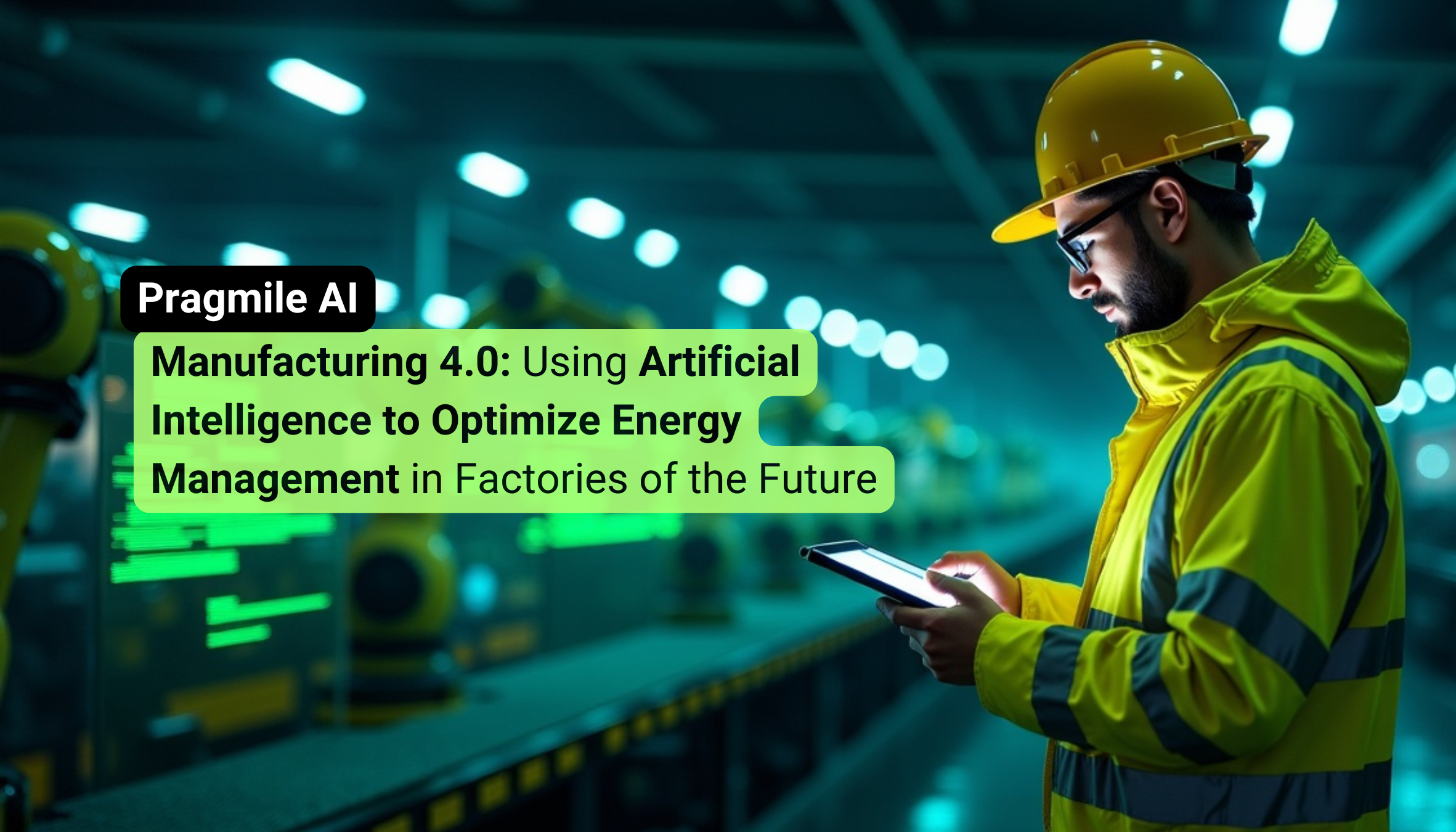
Published: 20 February 2025
Manufacturing 4.0: Using Artificial Intelligence to Optimize Energy Management in Factories of the Future
In the era of the fourth industrial revolution, also known as Industry 4.0 or Manufacturing 4.0, technologies based on artificial intelligence (AI) are becoming increasingly important. The introduction of AI to optimize energy management in factories is a key step towards more efficient, economical and ecological production. Traditional methods of managing energy consumption are becoming insufficient, which is why industrial companies are reaching for cutting-edge analytical tools and control systems supported by artificial intelligence, which enable more precise monitoring and control of energy consumption.
The Challenges of Energy Management in Factories
Energy management is one of the most important aspects of any factory’s operation. Electricity consumption accounts for a significant part of the operating costs of manufacturing companies. Traditional management methods are often based on manual measurements and analysis of historical data, which can lead to underperformance and inefficient use of available resources.
Artificial intelligence offers new possibilities by allowing for the automation of decision-making processes and providing data in real time. With AI, it is possible to optimize energy consumption by dynamically adapting production systems to changing conditions.
One of the main challenges facing manufacturing plants is the rising cost of energy. Effective management of electricity is becoming a key factor determining the profitability of companies. AI allows for the analysis of energy consumption in real time, optimizing its consumption depending on the current needs of the plant.
Another challenge is the integration of energy management with the production process. Optimization of production processes cannot be separated from efficient use of energy. AI systems allow for the adjustment of machine operating parameters in such a way as to minimize power consumption while maintaining their high efficiency.
More and more factories decide to use renewable energy (LINK), especially solar energy. However, managing energy from photovoltaics requires advanced algorithms that predict weather conditions and optimize consumption depending on the level of energy production, which is another key challenge for industrial companies. Fortunately, artificial intelligence is great at dealing with each of these aspects.
How Does Artificial Intelligence Support Energy Management in the Industrial Sector?
The potential for AI in energy management in the industrial sector – especially machine learning and predictive analytics – is truly enormous. The global market of artificial intelligence in energy industry (LINK) reached $8.91 billion in 2024 and is expected to grow to $58.66 billion by 2030.
AI algorithms, based on huge data sets, can identify hidden patterns and correlations that are invisible to the human eye. This allows, among other things, to the following:
- Accurately Forecast Energy Demand based on historical data and current machine operating conditions, allowing for better resource management and avoiding costly energy consumption peaks.
- Optimization of Machine and Devices Operation by adjusting appropriate parameters in real time, which minimizes their energy consumption without negatively affecting production efficiency.
- Monitoring and Automatic Analysis of Energy Consumption in real time combined with data visualization within intuitive energy management dashboard, enabling decision-making and optimization actions leading to minimization of energy losses.
Implementation of artificial intelligence in energy management in industrial plants brings a number of benefits, such as the following:
- Reduction of Energy Costs – optimization of energy consumption using AI leads to a significant reduction of energy bills.
- Improved Energy Efficiency – AI enables identification and elimination of energy losses, which results in increased energy efficiency of factories.
- Reduction of Greenhouse Gas Emissions – reducing energy consumption thanks to AI contributes to the reduction of greenhouse gas emissions and allows factories to adapt to strict regulations regarding, among others, CO2 emissions.
- Improved Work Safety and Reliability – monitoring the condition of machines and devices using AI allows for early detection of failures and prevention of production downtime.
Implementation of artificial intelligence in energy management in factories brings numerous benefits, including significant cost savings, increased operational efficiency, reduction of CO2 emissions and improvement of reliability of energy systems. AI enables real-time monitoring and analysis of energy consumption, which allows optimal decision-making. With predictive algorithms, factories can avoid unplanned downtime and minimize energy losses, leading to more sustainable production and improved market competitiveness.
Google Case Study: Using AI to Optimize Data Center Cooling and Reduce Energy Consumption by 40%
Advanced AI-based solutions aimed at optimizing energy management are used by more and more industrial sectors. For example, their use in cement factories or steelworks (LINK) is often associated not only with facing the challenges of high energy intensity, but also with a high need to control greenhouse gas emissions, especially CO2.
Many branches of modern industry requiring large data storage and processing capacity, such as the automotive industry developing autonomous vehicles, could not exist without data centers. They consume huge amounts of energy, and a significant part of it is spent on cooling the server infrastructure. Traditional cooling management methods are based on static settings and are not always able to adapt to dynamic operating conditions, which leads to non-optimal energy consumption.
Fortunately, AI can come to the rescue, as evidenced by Google’s case (LINK), which used DeepMind’s machine learning algorithms to optimize data center cooling systems. The goal was to improve the data center’s energy efficiency by reducing the energy needed to cool servers, which generate significant amounts of heat during operation.
DeepMind’s research team developed a neural network-based system that analyzed data from data centers in real time, taking into account various operating scenarios and parameters. This allowed the AI model to predict cooling demand and adjust cooling system settings more precisely than traditional methods. Implementation of this solution reduced the energy consumption of data center cooling by 40%.
The AI use case in Google’s data centers demonstrates how advanced machine learning algorithms can effectively optimize energy consumption in industry. By analyzing big data and dynamically adjusting operating parameters, enterprises and factories can achieve energy efficiency improvements. Google notices potential in using its AI-based technology to improve power plant conversion efficiency (getting more energy from the same unit of input), reduce energy and water consumption in semiconductor manufacturing and increase the throughput of manufacturing plants, among other things.
If your company is interested in topics such as production process optimization with AI, energy management, artificial intelligence in Industry 4.0, artificial intelligence applications in manufacturing, Manufacturing 4.0, schedule a free consultation with Marcin Jabłonowski – Managing Director and AI Solutions Architect at Pragmile now.
Schedule a free consultation with
our AI and technology experts
Take advantage of the latest AI solutions, tailored to your company's needs. Book a consultation with AI solution architects at Pragmile and discover new opportunities in energy management.
Please, provide your business email to schedule a meeting

